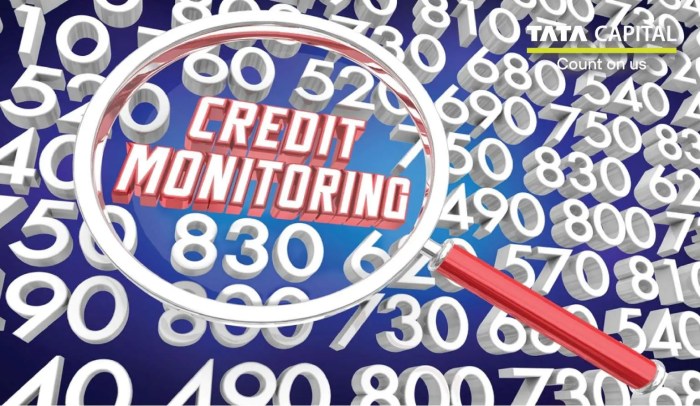Yo, peeps! Let’s dive into the importance of credit monitoring and why it’s crucial for your financial well-being. We’re about to break down why keeping an eye on your credit score is key to staying on top of your game.
As we move forward, we’ll explore how credit monitoring works, understand credit reports, and give you some killer tips for effective credit monitoring. So, buckle up and get ready to level up your credit game!
Importance of Credit Monitoring
Credit monitoring is crucial for maintaining good financial health. By keeping track of your credit score and report, you can stay informed about your financial standing and make informed decisions regarding loans, credit cards, and other financial matters.
Benefits of Regularly Monitoring Your Credit Score
Regularly monitoring your credit score has several benefits:
- Allows you to detect errors or inaccuracies on your credit report, which can impact your credit score negatively.
- Helps you identify any unauthorized or suspicious activity on your credit accounts, which could be a sign of identity theft.
- Enables you to track your progress in building and maintaining good credit, which is essential for qualifying for loans and favorable interest rates.
Examples of How Credit Monitoring Can Help Prevent Identity Theft
Credit monitoring can play a crucial role in preventing identity theft by:
- Alerting you to any new accounts opened in your name without your knowledge or consent.
- Notifying you of any significant changes to your credit report, such as a sudden drop in your credit score.
- Providing you with timely updates on any potential fraudulent activity, allowing you to take immediate action to protect your identity.
How Credit Monitoring Works
When it comes to credit monitoring, the process involves keeping a close eye on your credit report to detect any suspicious activity or errors that could potentially impact your credit score. This proactive approach allows you to identify and address any issues promptly, helping you maintain good credit health.
Role of Credit Bureaus
Credit bureaus play a crucial role in credit monitoring by collecting and maintaining credit information on individuals. They receive data from various creditors and financial institutions, which is then used to generate credit reports. These reports contain details about your credit history, including payment history, credit utilization, and any negative marks such as late payments or collections.
Tools and Services for Credit Monitoring
- Credit Monitoring Services: Companies offer monitoring services that track changes in your credit report and alert you to any suspicious activity.
- Credit Score Tracking: Tools allow you to monitor your credit score regularly and see how it changes over time.
- Credit Report Access: Services provide access to your full credit report so you can review all the information and look for any discrepancies.
- Fraud Alerts: You can set up fraud alerts with credit bureaus to be notified of any new accounts opened in your name.
Understanding Credit Reports

Understanding your credit report is essential for managing your financial health and making informed decisions. A credit report is a detailed record of your credit history, including your credit accounts, payment history, and other relevant information. By reviewing your credit report regularly, you can identify any errors or fraudulent activity and take steps to improve your credit score.
Components of a Credit Report
- Your personal information: This includes your name, address, social security number, and date of birth.
- Credit accounts: Details of your credit accounts, such as credit cards, loans, and mortgages, including balances, payment history, and credit limits.
- Public records: Any bankruptcies, liens, or judgments that may impact your credit score.
- Inquiries: A list of entities that have requested your credit report, such as lenders or landlords.
Factors Influencing Your Credit Score
- Payment history: Timely payments positively impact your credit score, while late payments can lower it.
- Credit utilization: The amount of credit you use compared to your total credit limit. Keeping this ratio low can boost your score.
- Length of credit history: The longer your credit history, the more information lenders have to assess your creditworthiness.
- Types of credit: Having a mix of credit types, such as credit cards and loans, can positively impact your score.
- New credit: Opening multiple new credit accounts in a short period can lower your score.
How Credit Monitoring Helps
- Early detection of errors: Credit monitoring can alert you to any inaccuracies on your credit report, allowing you to address them promptly.
- Fraud detection: Monitoring your credit can help you identify any unauthorized activity or signs of identity theft.
- Track changes: By regularly monitoring your credit report, you can track changes in your credit score and take steps to improve it over time.
Tips for Effective Credit Monitoring
Monitoring your credit effectively is essential for maintaining good financial health and protecting yourself from identity theft. Here are some tips to help you make the most out of credit monitoring:
Check Your Credit Report Regularly
- Set up reminders to check your credit report at least once a year from all three major credit bureaus: Equifax, Experian, and TransUnion.
- Consider using a credit monitoring service that provides regular updates on changes to your credit report.
Understand What to Look For
- Look for any inaccuracies, such as incorrect personal information, accounts you don’t recognize, or suspicious activity.
- Pay attention to your credit score and understand how it is calculated.
Act Promptly on Suspicious Activity
- If you notice any unauthorized transactions or accounts on your credit report, report them to the credit bureau and the relevant financial institution immediately.
- Consider placing a fraud alert or credit freeze on your accounts to prevent further fraudulent activity.
